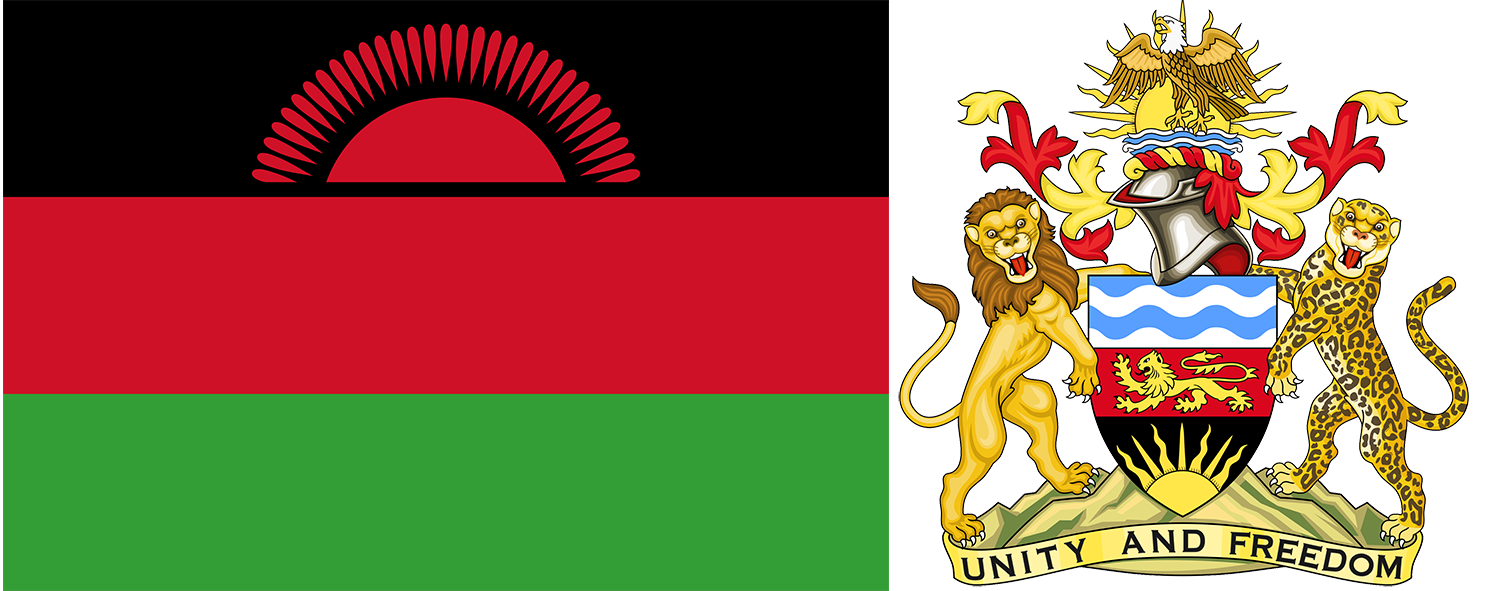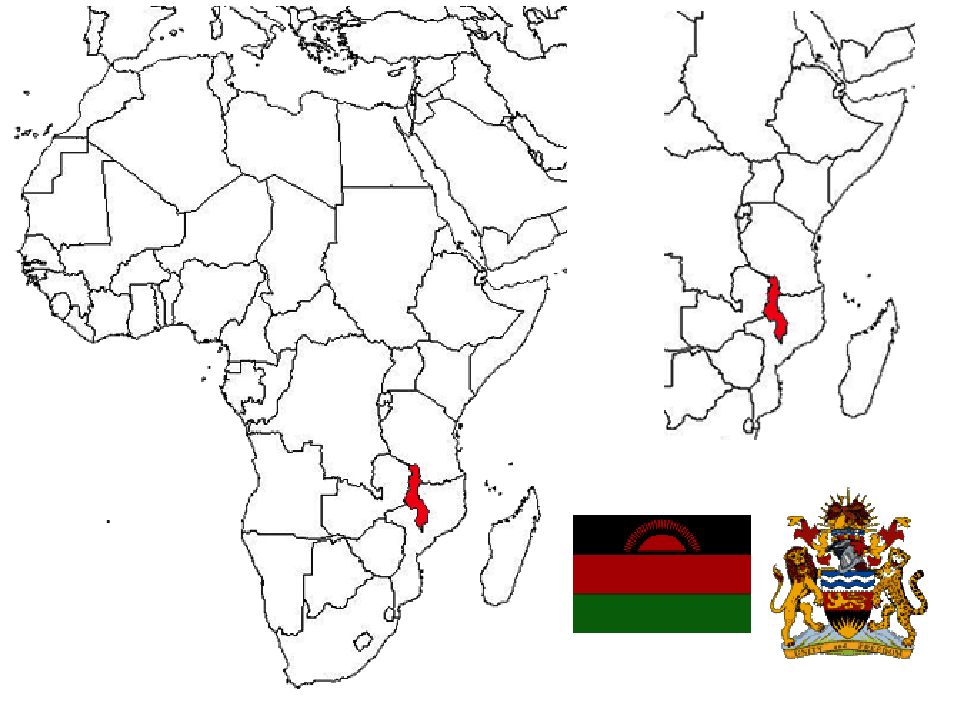FabulousFusionFood's Malawian recipes Home Page
 The flag of Malawi (left) and the Coat of Arms (right).
The flag of Malawi (left) and the Coat of Arms (right).
Welcome to the summary page for FabulousFusionFood's Malawian recipes, part of the African Continent. This page provides links to all the Malawian recipes presented on this site, with 22 recipes in total.
Malawi, officially: Dziko la Malaŵi; Republic of Malawi is an East African country bordering the Great Lakes. The capital is Lilongwe and its largest city is Blantyre and the country gained independence from Britain on July 6th 1964.
With the exception of the introduction of cassava, peanuts and chillies, Malawian cuisine has remained relatively free of outside influences. The traditional staple food is a thick maize porridge (replacing millet) that's shaped into patties and served as an accompaniment with beans, meat or vegetables. Rice and futou (mashed plantain and cassava) and fufu (fermented cassava) are also staples. Fish is the main source of protein, with many of these fish being derived from lake Malawi itself. Tilapia is the country's speciality fish and the local catfish is also frequently cooked.
Malawi, officially the Republic of Malawi (Dziko la Malaŵi in Chichewa and Charu cha Malaŵi in Chitumbuka) and formerly known as Nyasaland, is a landlocked country in Southeastern Africa. It is bordered by Zambia to the west, Tanzania to the north and northeast, and Mozambique to the east, south and southwest. Malawi spans over 118,484 km2 (45,747 sq mi) and has an estimated population of 19,431,566 (as of January 2021). Malawi's capital and largest city is Lilongwe. Its second-largest is Blantyre, its third-largest is Mzuzu and its fourth-largest is Zomba, the former capital.
 The image above shows Malawi in (red) in relation to Africa (left) and
The image above shows Malawi in (red) in relation to Africa (left) and
East Africa (right).The part of Africa now known as Malawi was settled around the 10th century by migrating Bantu groups. Centuries later, in 1891, the area was colonised by the British as the British Central African Protectorate, and it was renamed as Nyasaland in 1907. In 1953, it became a protectorate within the semi-independent Federation of Rhodesia and Nyasaland. The Federation was dissolved in 1963. In 1964, the protectorate was ended: Nyasaland became an independent country as a Commonwealth realm under Prime Minister Hastings Banda, and was renamed Malawi. Two years later, Banda became president by converting the country into a one-party presidential republic. Banda was declared President for life in 1971, and Malawi's next few decades of independence were characterized by Banda's highly repressive dictatorship. Following the introduction of a multiparty system in 1993, Banda was defeated in the 1994 general election. Today, Malawi has a democratic, multi-party republic headed by an elected president and has continued to experience peaceful transitions of power. According to the 2024 V-Dem Democracy indices Malawi is ranked 74th electoral democracy worldwide and 11th electoral democracy in Africa. The country's military, the Malawian Defence Force, includes an army, a navy, and an air wing. Malawi's foreign policy is pro-Western.
Malawi has a low life expectancy and high infant mortality. HIV/AIDS is highly prevalent, which both reduces the labour force and requires increased government expenditures. The country has a diverse population that includes native peoples, Asians, and Europeans. Several languages are spoken, and there is an array of religious beliefs. Although in the past there was a periodic regional conflict fuelled in part by ethnic divisions, by 2008 this internal conflict had considerably diminished, and the idea of identifying with one's Malawian nationality had reemerged.
The first name given to what is known now as Malawi was Nyasaland, a combination of the Lomwe word nyasa 'lake' and the English word 'land'. The combined name was formed by David Livingstone, a Scottish explorer and missionary who led the legendary Zambezi Expedition through the area in the mid-1800s. The current name Malawi, meaning 'flames' in the Chichewa and Chitumbuka la guages, was chosen by the first president of Malawi, Kamuzu Banda, after the country achieved its independence from Great Britain in 1964.
Malawi, officially: Dziko la Malaŵi; Republic of Malawi is an East African country bordering the Great Lakes. The capital is Lilongwe and its largest city is Blantyre and the country gained independence from Britain on July 6th 1964.
With the exception of the introduction of cassava, peanuts and chillies, Malawian cuisine has remained relatively free of outside influences. The traditional staple food is a thick maize porridge (replacing millet) that's shaped into patties and served as an accompaniment with beans, meat or vegetables. Rice and futou (mashed plantain and cassava) and fufu (fermented cassava) are also staples. Fish is the main source of protein, with many of these fish being derived from lake Malawi itself. Tilapia is the country's speciality fish and the local catfish is also frequently cooked.
Malawi, officially the Republic of Malawi (Dziko la Malaŵi in Chichewa and Charu cha Malaŵi in Chitumbuka) and formerly known as Nyasaland, is a landlocked country in Southeastern Africa. It is bordered by Zambia to the west, Tanzania to the north and northeast, and Mozambique to the east, south and southwest. Malawi spans over 118,484 km2 (45,747 sq mi) and has an estimated population of 19,431,566 (as of January 2021). Malawi's capital and largest city is Lilongwe. Its second-largest is Blantyre, its third-largest is Mzuzu and its fourth-largest is Zomba, the former capital.
 The image above shows Malawi in (red) in relation to Africa (left) and
The image above shows Malawi in (red) in relation to Africa (left) andEast Africa (right).
Malawi has a low life expectancy and high infant mortality. HIV/AIDS is highly prevalent, which both reduces the labour force and requires increased government expenditures. The country has a diverse population that includes native peoples, Asians, and Europeans. Several languages are spoken, and there is an array of religious beliefs. Although in the past there was a periodic regional conflict fuelled in part by ethnic divisions, by 2008 this internal conflict had considerably diminished, and the idea of identifying with one's Malawian nationality had reemerged.
The first name given to what is known now as Malawi was Nyasaland, a combination of the Lomwe word nyasa 'lake' and the English word 'land'. The combined name was formed by David Livingstone, a Scottish explorer and missionary who led the legendary Zambezi Expedition through the area in the mid-1800s. The current name Malawi, meaning 'flames' in the Chichewa and Chitumbuka la guages, was chosen by the first president of Malawi, Kamuzu Banda, after the country achieved its independence from Great Britain in 1964.
Malian Cuisine
Malawian cuisine is diverse, with tea and fish being popular features of the country's cuisine. Sugar, coffee, corn, potatoes, sorghum, cattle and goats are also important components of the cuisine and economy. Lake Malawi is a source of fish including chambo (similar to bream), usipa (similar to sardines), and mpasa (similar to salmon and kampango). Nsima is a food staple made from ground corn and typically served with side dishes of meat and vegetables. It is commonly eaten for lunch and dinner.The alphabetical list of all Malawian recipes on this site follows, (limited to 100 recipes per page). There are 22 recipes in total:
Page 1 of 1
| Chimbama (Banana and Maize Meal Bread) Origin: Malawi | Mtedza (Peanut Puffs) Origin: Malawi | Steak Cooked in Milk Origin: Malawi |
| Fried White Ants Origin: Malawi | Mtedza Puffs Origin: Malawi | Ujeni Ndiwo Origin: Malawi |
| Futali Origin: Malawi | Nali Sauce (Piri-piri Sauce) Origin: Malawi | Vegetable Ndiwo Origin: Malawi |
| Malawi Curry Powder Origin: Malawi | Ngaiwa Phala (Sweetened Maize Porridge) Origin: Malawi | Zitumbuwa (Banana Fritters) Origin: Malawi |
| Malawian Biltong Origin: Malawi | Nsima Origin: Malawi | Zitumbuwa (Banana Fritters II) Origin: Malawi |
| Mandazi Fritters Origin: Malawi | Nsima Origin: Malawi | Zitumbuwa (Malawian Banana Fritters) Origin: Malawi |
| Mbatata Biscuits (Sweet Potato Biscuits) Origin: Malawi | Nthochi Bread (Banana Bread) Origin: Malawi | |
| Mkhwani with Groundnut Flour Origin: Malawi | Rice Phala (Sweetened Rice Phala) Origin: Malawi |
Page 1 of 1